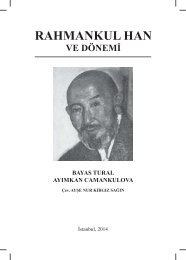THE SOVIET HISTORIOGRAPHY AND THE QUESTION OF KAZAKHSTAN’S HISTORY
SOVYET-TARIH-YAZICILIGI-ENG
SOVYET-TARIH-YAZICILIGI-ENG
Create successful ePaper yourself
Turn your PDF publications into a flip-book with our unique Google optimized e-Paper software.
72<br />
<strong>THE</strong> <strong>SOVIET</strong> <strong>HISTORIOGRAPHY</strong> <strong>AND</strong><br />
(B.A. Aspandiyarov, I.U. Budovits, A.M. Zhirenchin, E.D. Dilmuhamedov)<br />
there prevailed a tendency to praise the monograph, without taking<br />
into account any criticisms that were expressed during its discussion<br />
in Moscow at the Institute of History of USSR SA. 98<br />
The speeches of the third group of speakers (A.N. Nusupbekov,<br />
T.E. Eleuov, Kh.M. Adilgereyev, T.A. Kulteleyev, A.B. Tursunbayev, S.G.<br />
Medvedev et al.) differed in a detailed, analytical approach to the<br />
monograph “Kazakhstan in 20-40s of XIX. Century”.<br />
In general, this group highly praised the scientific level of the book<br />
and agreed with the assessment of the 1837-1847s uprising led by<br />
Kenessary Kassymov as an anti-colonial one; these scientist-historians<br />
expressed a number of significant comments:<br />
• The presence in one place the wrong thesis about the revolutionary<br />
nature of the uprising led by Kenessary Kassymov;<br />
• There was not enough to substantiate the differences in economic<br />
structures, culture and way of life of Kazakh Zhuzes in<br />
general;<br />
• The existence of non-critical attitude to folklore as a historical<br />
source;<br />
• The existence of idealization of Kenessary Kassymov. 99<br />
As we can see, practically the discussion of a scientific work was<br />
transferred to the political stage. As it is known, Ermukhan Bekmakhanov<br />
was the victim of total repression during the postwar period<br />
and was sentenced to 25 years in prison.<br />
Only under the conditions of gaining independence for Kazakhstan<br />
were researchers able to restore the “gaps” in the historiography of<br />
the state’s history, including the issues of political campaigns of the<br />
totalitarian regime against the intellectuals of the republic in 1940s<br />
and 1950s.<br />
BIBLIOGRAPHY<br />
БольШевик Кaзaхстaнa, 1945, No 6, s. 49 – 51.<br />
Гуревич Л., Тотaлитaризм против интеллигенции. Из истории<br />
политики тотaлитaрного госудaрствa в отноШении интеллигенции<br />
Кaзaхстaнa, Almatı, 1992.<br />
98 Қозыбaев М. Қ., “Нұрпейісов К.Н. ТaҒдыры күрделіaйсaр тaлaнт”, Социaлистік ҚАзaҚстaн, 1989, 18<br />
ҚАнтaр; История Кaзaхстaнa: белые пятнa. – С. 34-49, pp. 42-48, 80-84, 90-94, 127-134.<br />
99 Қозыбaев М. Қ., “Нұрпейісов К.Н. ТaҒдыры күрделі ҚАйсaр тaлaнт”, Социaлистік ҚАзaҚстaн,<br />
1989, 18 ҚАнтaр; История Кaзaхстaнa: белые пятнa. – С. 34-49, pp. 53-59, 60-64, 72-79,<br />
85-90, 145-151.



